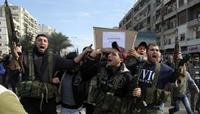-
Russia: Syria rebels used sarin gas
Vitaly Churkin, Russia’s UN ambassador, announced at a UN news conference Tuesday that scientific analysis by Russian labs of a suspected chemical weapons attack in Syria on 19 March concluded the attack probably had been carried out by rebels using sarin nerve gas of “cottage industry” quality. He said the gas was delivered by a crudely made missile.
-
-
Gen. Dempsey: Syria could be a “10-year issue”

The U.S. top soldier said the United States is facing a “10-year issue” in Syria: “if we fail to think about [the Syrian issue] as a 10-year regional issue, we could make some mistakes,” General Martin Dempsey, chairman of the Joint Chiefs of Staff, said.
-
-
House speaker clarifies position on immigration reform
House Speaker John Boehner (R-Ohio) told reported on Monday that improvements in border security must be “in place” before a pathway to immigration is to begin. Boehner will head a special meeting of the House Republican Conference today to debate immigration reform.
-
-
U.S., China begin formal cybersecurity talks
U.S. and Chinese officials have begun a week of formal discussions on cybersecurity. A bi-lateral group held its first meeting Monday at the State Department with both civilians and military officials included in the talks.
-
-
Senate panel to investigate DHS IG office
The Senate Committee on Homeland Security and Governmental Affairs is investigating the Inspector General at DHS on allegations of nepotism, abuse of power, and covering up a Secret Service prostitution scandal.
-
-
Jihadi cleric Abu Qatada deported from U.K. to stand trial in Jordan

After eight years of protracted and costly legal battles, Jihadi cleric Abu Qatada was deported from the United Kingdom to Jordan. Sunday morning he was flown on private chartered jet, accompanied by four British police officers, who handed him over to their Jordanian counterparts. Abu Qatada’s deportation to his native Jordan has cost the U.K. government a total o £1.7 million, of which£647,658 went to pay for the public defenders of the cleric.
-
-
Nigerian Islamic extremists burn children alive during attack on boarding school

At least twenty-nine high school students and a teacher are dead after militants from the Islamic Boko Haram group attacked a boarding school in northeast Nigeria. The Islamists set the school dorm on fire while students, aged 10 to 15, were sleeping inside. Most of the dead were burned alive inside the dorm. The militant waited outside the dorm, and shot those who tried to escape the burning building.
-
-
U.S. ports vulnerable to cyberattacks
New study says that the U.S. largest ports are vulnerable to cyberattacks.The study argues that the level of cyber security awareness and culture in U.S. port facilities is relatively low, and that a cyberattack at a major U.S. port would quickly cause significant damage to the economy.
-
-
Improving the reliability, resiliency of post-Sandy N.J. electric grid
According to NOAA, prolonged electrical outages, largely because of storms, have been steadily increasing in frequency since 1995. Sandia Lab will help East Coast communities devastated by Hurricane Sandy boost the resiliency of their electric grids, so they can be better prepared to deal with natural disasters in the future.
-
-
Arab world welcomes Brotherhood’s fall
Leaders throughout the Arab world could barely contain their glee at the news that the short and acrimonious era of Muslim Brotherhood rule in Egypt is over, and is not likely to return. The fractious Arab world has rarely shown such unanimity. Familiarity breeds contempt, though, and the antipathy toward the Brotherhood and its brand of politics has always been something most Arabs – secular and religious – could agree on, and on Thursday the region was awash with schadenfreude.
-
-
Protecting drinking water systems from deliberate contamination

The importance of water and of water infrastructures to human health and to the running of the economy makes water systems likely targets for terrorism and CBRN (chemical, biological, and radionuclide) contamination. Reducing the vulnerability of drinking water systems to deliberate attacks is one of the major security challenges. An international project has developed a response program for rapidly restoring the use of drinking water networks following a deliberate contamination event.
-
-
Egypt’s military ousts Morsi from the presidency, suspends constitution
Acting on its ultimatum, the Egyptian military has ousted Mohammed Morsi from the presidency of Egypt and announced that the constitution, ratified last December, has been suspended. Parliament, too, has been disbanded. Government ministers were ordered to clean their desks and vacate their offices. The chief of the constitutional court will assume the role of president on an interim basis.
-
-
Isolated, defiant Morsi rallies his supporters for battle as army’s ultimatum looms
Facing an ultimatum issued Monday by Egypt’s powerful army, President Mohamed Morsi, in a midnight speech, defiantly announced that he would not resign under pressure and, if necessary, protect his presidency with his life. Analysts note that the speech was aimed to rally his Islamic supporters and prepare them for likely violence ahead, rather than placate the protesters or signal his willingness to reconcile with the demands of the military. The military gave Morsi until 17:00 Egypt’s time (10:00 a.m. EST) to meet the protesters’ demands – chief among them Morsi’s own resignation. In response to Morsi’s speech, the Egyptian military announced: “We swear to God that we will sacrifice even our blood for Egypt and its people, to defend them against any terrorist, radical or fool.”
-
-
Senate immigration bill could yield billions in federal contracts
The Senate immigration bill will see billions of dollars go to defense and technology companies as a result of billions of dollars in new and expanded federal contracts aiming to bolster border security.
-
-
U.S. tax code has minimal effect on CO2, other greenhouse gas emissions
Current federal tax provisions have minimal net effect on greenhouse gas emissions, according to a new report from the National Research Council. The report found that several existing tax subsidies have unexpected effects, and others yield little reduction in greenhouse gas emissions per dollar of revenue loss.
-
More headlines
The long view
Preventing Another 'Jan. 6' Starts by Changing How Elections Are Certified, Experts Say
The 2024 presidential election may be a rematch between President Joe Biden and former President Donald Trump, but preventing a repeat of Jan. 6, 2021 — when false claims of a stolen election promoted by Donald Trump and his allies led to an insurrection at the U.S. Capitol —will be top of mind this election year. Research finds broad support among public for nonpartisan certification commissions.
States Rush to Combat AI Threat to Elections
This year’s presidential election will be the first since generative AI became widely available. That’s raising fears that millions of voters could be deceived by a barrage of political deepfakes. Congress has done little to address the issue, but states are moving aggressively to respond — though questions remain about how effective any new measures to combat AI-created disinformation will be.
Chinese Government Hackers Targeted Critics of China, U.S. Businesses and Politicians
An indictment was unsealed Monday charging seven nationals of the People’s Republic of China (PRC) with conspiracy to commit computer intrusions and conspiracy to commit wire fraud for their involvement in a PRC-based hacking group that spent approximately 14 years targeting U.S. and foreign critics, businesses, and political officials in furtherance of the PRC’s economic espionage and foreign intelligence objectives.
European Arms Imports Nearly Double, U.S. and French Exports Rise, and Russian Exports Fall Sharply
States in Europe almost doubled their imports of major arms (+94 per cent) between 2014–18 and 2019–23. The United States increased its arms exports by 17 per cent between 2014–18 and 2019–23, while Russia’s arms exports halved. Russia was for the first time the third largest arms exporter, falling just behind France.
LNG Exports Have Had No Impact on Domestic Energy Costs: Analysis
U.S. liquified natural gas (LNG) exports have not had any sustained and significant direct impact on U.S. natural gas prices and have, in fact, spurred production and productivity gains, which contribute to downward pressure on domestic prices.
